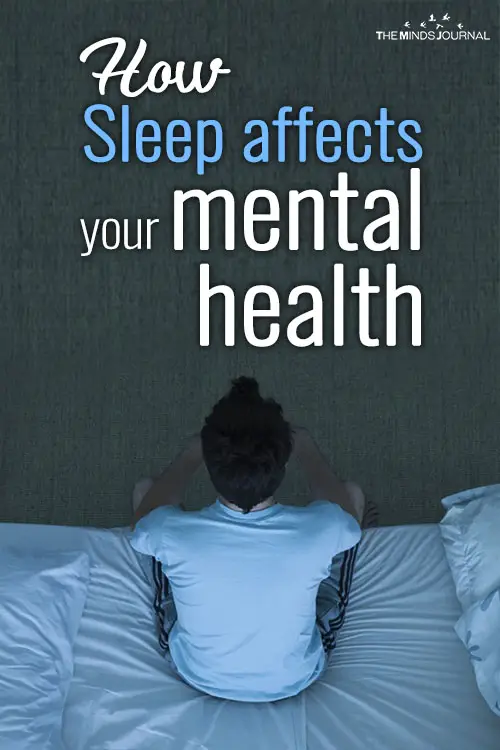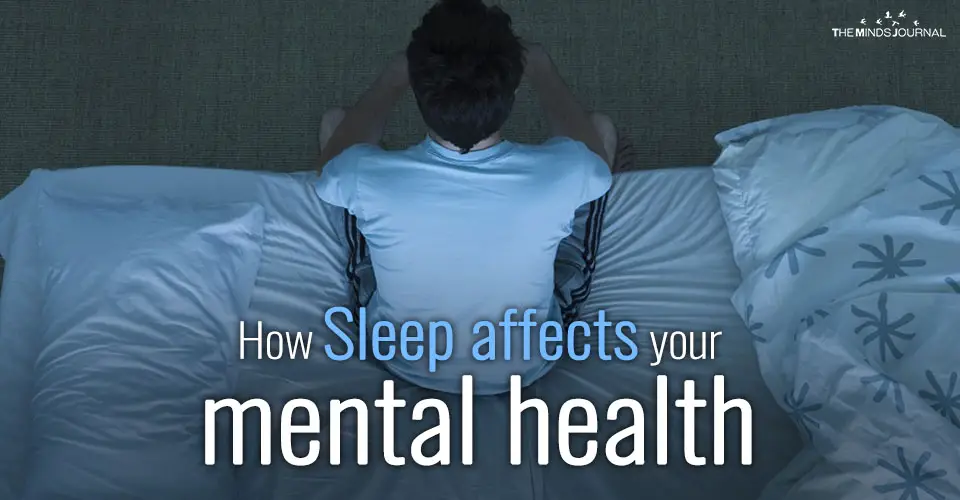The quality and amount of sleep play a huge role in the mental health and mood of an individual.
Even just one night of inadequate sleep can heighten one’s stress level. Constant lack of sleep and chronic sleep deprivation can alter a person’s disposition and may even lead to mental health issues like anxiety and depression. In fact, a lot of research is now establishing links between insomnia and depression and how the two can interchangeably affect each other.
Sleep and mental health are broad and complex topics that still need further research to be able to fully grasp and comprehend well about them. All the same, the more we dig deeper with the topics, the more facts we find regarding the key role of sleep in our physical and mental well-being.
In this article, we’ll go a little dipper with what is already learned regarding sleep and how it is comparative with the mental and emotional health of a person. We’ll also tackle some tips from the connoisseurs that can help improve your sleep and help you put on the right track.
The Relationship Between Sleep and Mood
Mood signifies the emotional state of an individual. Not getting a goodnight’s sleep can contribute to a negative disposition or mood of a person. Someone who lacks enough sleep is more likely to be irritable, sad, stressed out, fatigued, frustrated, etc. In one study from the University of Pennsylvania, they have reduced the sleeping time of their participants by one-third for a week. The study showed that the lack of sleep has negatively affected the mood of the participants.
On the other side of the coin, getting enough sleep can also improve one’s disposition. Even in the aforementioned study, the mood of the participants remarkably improved after getting enough sleep. Having enough sleep during the night can make you feel more refreshed, energized, and revitalized even at the start of your day. This will influence how you will feel during the day and interact with others.
However, the quality of sleep is as important as its quantity. If you have fragmented or very light sleep, chances are you still won’t get the same feeling as those who have the same hours yet have a smooth-sailing and undisturbed sleep.
Sleep and Emotional Reactivity
Emotional reactivity means the situation wherein our immediate emotional reactions are quite hard to manage. Usually, it manifests as outbursts, lashing out, withdrawing, feeling hurt, or having an incomplete ability to control response to a certain stimulus.
Though a small amount of emotional reactivity is normal at times, emotional wellness helps from being aware and mindful of the other person’s emotions so as to prevent someone become all-encompassing. Alas, poor sleep makes this ordeal more difficult as the person’s mood and mental bandwidth are weakened thus, making a person more inclined to volatile reactions. Furthermore, this may complicate miscommunications and may even crush relationships with friends, workmates, schoolmates, loved ones, etc.
How Insomnia Affects Mental Health
Insomnia is a broad term that refers to the struggle of falling asleep, failure to sleep over the night, and/or awakening early in the morning. If it continues for a while, it may probably lead to chronic insomnia which has been found out by studies to be connected to some mental health concerns.
“Epidemiological studies, the gathering of information about health conditions by looking into patterns and connections in the data, have significantly overlapped insomnia with other mental health conditions such as depression, anxiety, bipolar disorder, schizophrenia, and ADHD.” says Dr.Mark, a specialist doctor at DoctorSpring. However, it is important to note that sleep doesn’t cause these conditions but are found to be concurrent in a lot of patients.
The Relationship Between Sleep and Other Mental Health Issues
When looking at the connection between sleep deprivation such as insomnia and mental health problems, it becomes clear that these two are mutually related and reinforcing each other. The hard part is that both these problems feed into each other, making it more difficult to solve them.
Sleep and Anxiety
Studies revealed that people who live with insomnia are more likely to strive with anxiety as well. Research from the University of California Berkeley has found out that not getting adequate sleep may trigger and agitate some parts of the brain connected with anxiety. As a result, people who are inclined to have anxiety attacks are more likely to be negatively influenced by sleep deprivation.
Sleep and Depression
Depression is a complicated condition that may include an intense feeling of loneliness, lack of energy, extreme daytime sleepiness or insomnia, narrowed concentration, and among others. These feelings are magnified if a person is not getting adequate sleep. Depression will most likely occur in people who have chronic sleep problems.
Sleep and Attention Deficit Hyperactivity Disorder
Commonly, people with ADHD and autism are more prone to lack of sleep, maybe because of the condition itself or loads of medication used to manage the condition. With limited or fragmented sleep, mood and daytime concentration can be further confronted for people with ADHD.
Sleep and Schizophrenia
People who have schizophrenia, usually affecting around 1% of the total population of the USA, are more inclined to have interrupted and irregular sleeping patterns. This will make the condition even harder to address. Though, some research studies have shown promising effects of reducing the clinical manifestations of schizophrenia by treating the sleeping problem that comes with it.
How to Sleep Better to Lighten Up Your Mood?
Now that we already know how one’s quality and quantity of sleep can directly affect the disposition of an individual, we have cited some ways that might help you get a good night’s sleep.
Get Help
Although you may want to solve the issue yourself, getting help from a professional may do wonders for you. For any mental health issues, tapping a psychiatrist or counselor may give you a tremendous advantage. Studies have found out that simple talk therapy can do wonders in reducing insomnia and mental health issues. The cognitive-behavioral therapy for insomnia or (CBT-I) is a specific talk therapy that usually helps tackle the issue of depression and anxiety and their effect on sleep.
Talking to medical professionals may help you deal with sleep-related issues such as chronic snoring. People with sleep apnea can be effectively diagnosed and treated after tapping a medical expert.
Practicing Sleep Hygiene to Improve Sleep
Research about sleep has shown that it is easier to fall and stay asleep with the right sleeping habits or commonly called sleep hygiene. Carefully planning out your sleep hygiene will significantly improve your sleep routine. Here are some of the general principles you may use in planning and customizing your sleep hygiene.
- Go to bed and rise up according to your schedule: even during holidays, weekends, or vacations, you have to practice going to bed and waking up at the same time. This will help your body adjust to the normal routine which in turn will stabilize your circadian rhythm accordingly.
- Follow the same routine: a person’s sleep routine may not be applicable for you as it is tailored depending on your wants and needs. However, it is important to try to do the same set of steps before going to sleep to improve the associations of your routine with sleeping.
- Limit naps: having constant or long naps during daytime may make it harder to fall asleep at night.
- Build a bedroom conducive to sleep: make your bedroom the most comfortable place for sleeping. Consider buying a dark-colored curtain or a new mattress to make it more conducive for sleeping.
- Limit screen time: the stimulus from your mobile device plus light may make it much harder to relax and transition your body and mind to sleep. Try to avoid using your smartphones and limit screen time.
- Try to relax: listening to calm music, using aromatherapy, or deep breathing may help you relax and predispose yourself to sleep.
- Exercise: daily exercise can be good for improving your mood, mental health, and sleep.
Keep track of sleeping habits: it is beneficial to keep a record of what works and doesn’t work for your sleeping pattern and mood. You can also track your usual routine, sleeping time, wake up time, and mood the following day. This will also be very useful should you feel the need to talk with a counselor or medical professional.
You May Also Like:
Insomnia 101: Causes, Symptoms Of Insomnia & How To Sleep Better
Are Your Teenagers Getting Enough Sleep?
Do This When You Feel Sleepy At Work









Leave a Reply
You must be logged in to post a comment.